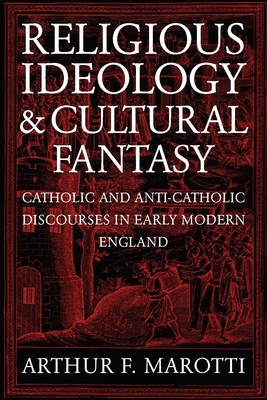
- We will send in 10–14 business days.
- Author: Arthur F Marotti
- Publisher: University of Notre Dame Press
- ISBN-10: 0268034796
- ISBN-13: 9780268034795
- Format: 16.5 x 23.7 x 2.5 cm, hardcover
- Language: English
- SAVE -10% with code: EXTRA
Reviews
Description
In this new book, Arthur F. Marotti analyzes some of the rhetorical and imaginative means by which the Catholic minority and the Protestant majority defined themselves and their religious and political antagonists in early modern England. He considers Catholic writings that have been relatively neglected, as well as the discourse of anti-Catholicism. Straddling the boundary of history and literature, this study offers an intriguing cultural history that focuses on the ideologized fantasies and language found on both sides of the early modern Christian religious divide. Marotti focuses on the period between the arrival of the first Jesuit missionaries in England in 1580 and the climax of ongoing religious conflict in the Restoration-era Popish Plot and the 1688 Glorious Revolution. In a series of thematically focused essays, he covers such issues as the relationship of print culture to the residual Catholic culture in Elizabethan England; recusant women, Jesuits and the cultural othering of Catholics, martyrdom accounts, the manuscript circulation of Catholic martyrdom accounts; polemically charged Catholic and Protestant narratives of conversion; and the depiction of Catholic plots or outrages and providential Protestant deliverances in the construction of Protestant English history and identity. This important and eagerly anticipated book makes a substantial contribution to our understanding of Catholicism and anti-Catholicism in the early modern period. It also points to a cultural dynamic in Anglo-American history that persisted far into the modern era.
EXTRA 10 % discount with code: EXTRA
The promotion ends in 19d.03:07:03
The discount code is valid when purchasing from 10 €. Discounts do not stack.
- Author: Arthur F Marotti
- Publisher: University of Notre Dame Press
- ISBN-10: 0268034796
- ISBN-13: 9780268034795
- Format: 16.5 x 23.7 x 2.5 cm, hardcover
- Language: English English
In this new book, Arthur F. Marotti analyzes some of the rhetorical and imaginative means by which the Catholic minority and the Protestant majority defined themselves and their religious and political antagonists in early modern England. He considers Catholic writings that have been relatively neglected, as well as the discourse of anti-Catholicism. Straddling the boundary of history and literature, this study offers an intriguing cultural history that focuses on the ideologized fantasies and language found on both sides of the early modern Christian religious divide. Marotti focuses on the period between the arrival of the first Jesuit missionaries in England in 1580 and the climax of ongoing religious conflict in the Restoration-era Popish Plot and the 1688 Glorious Revolution. In a series of thematically focused essays, he covers such issues as the relationship of print culture to the residual Catholic culture in Elizabethan England; recusant women, Jesuits and the cultural othering of Catholics, martyrdom accounts, the manuscript circulation of Catholic martyrdom accounts; polemically charged Catholic and Protestant narratives of conversion; and the depiction of Catholic plots or outrages and providential Protestant deliverances in the construction of Protestant English history and identity. This important and eagerly anticipated book makes a substantial contribution to our understanding of Catholicism and anti-Catholicism in the early modern period. It also points to a cultural dynamic in Anglo-American history that persisted far into the modern era.


Reviews